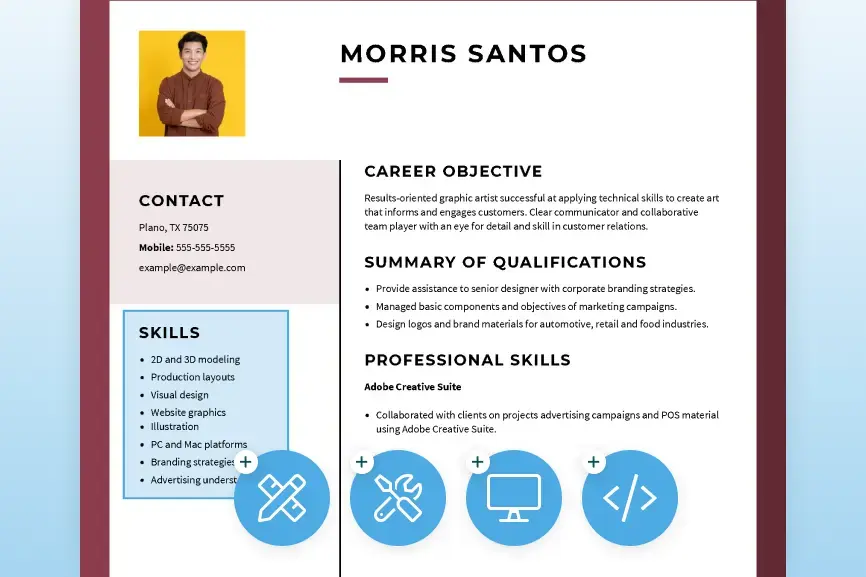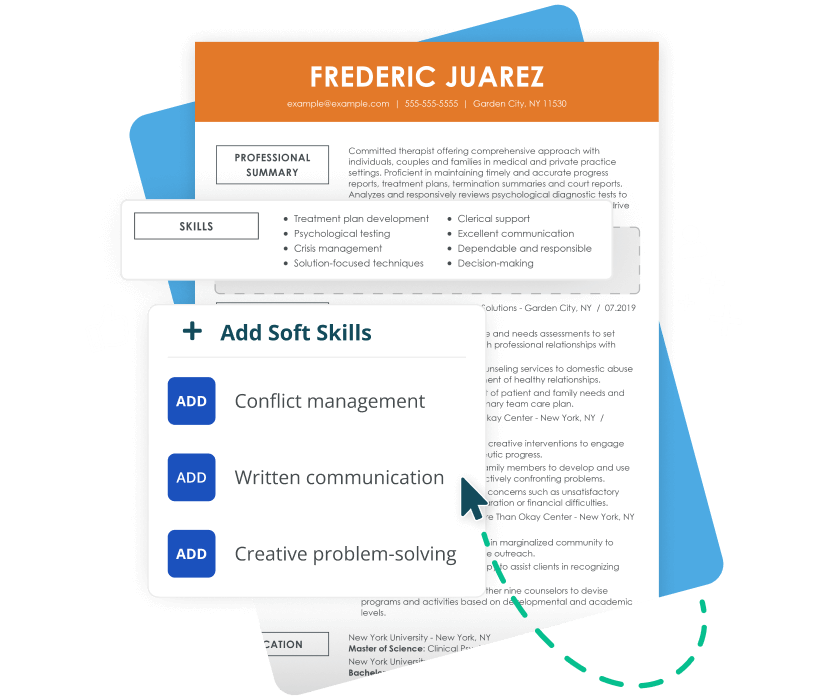- Featured in:
Hard skills help recruiters determine if a candidate has the knowledge and abilities required to perform the job. Listing industry-specific skills on your resume demonstrate your qualifications and technical abilities. Here you will find 100+ examples of the top hard skills for 2023.
Want a stronger resume to reflect your competence? Looking to update your current resume to reflect the appropriate skills? Try our resume builder. It’s fast and easy to use. Plus, you’ll get ready-made content to add with one click.
Or view our sample resumes made with our beautiful resume templates
What Are Hard Skills?
Hard or technical skills are abilities that can be taught. These sets of skills are important because they determine your ability to carry out a task that requires industry-specific knowledge.
Hard skills vs soft skills
Hard skills refer to what you do to achieve a work goal; they are much easier to prove, demonstrate or quantify than soft skills. Soft skills refer to how you achieve work goals and include attributes that range from leadership to work ethics to attitude.
For example, a person who is a web developer might possess hard skills like JavaScript fluency, app development or debugging. Their soft skill set could include written communication, patience and active listening skills just as crucial to performing the job.
To clarify this distinction, here are some examples of hard and soft skills:
Top Hard Skills Examples
Showcasing the right skills on your resume is the best way to show a recruiter that you are the ideal candidate to contribute to the company’s success. Here are the top hard skills to put on a resume and examples that impress employers. Hard skills to put on a resume
1 Management skills
Having management skills gives you the ability to perform executive duties, motivational skills and problem-solving. Polish your management skills through learning and practical experience as a manager.
- Communication
- Listening
- Analytical thinking
2 Presentation skills
Presentation skills allow you to communicate clearly and effectively. They help you to engage and persuade your audience.
- Organization
- Slideshows
- Presentation software
3 Marketing skills
Knowledge of marketing and economics gives you insight into marketing trends and economic principles. You can become a financial adviser and financial research analyst.
- SEO
- Data analysis
- WordPress
4 Computer skills
Being knowledgeable in computer skills means that you can operate hardware and software. Hardware skills allow you to operate a computer physically. While software skills help you to use computer programs and applications efficiently.
- Database management
- QuickBooks
5Technical skills
Also known as hard skills, technical skills are acquired by using and gaining expertise in performing physical or digital tasks. Many technical skills rely on mathematics, computer science, mechanics and information technology.
- Adobe
- HTML
- Programming
6Analytical skills
When an employer sees analytical skills on a resume, they know that the candidate has strong research skills, identifies problems and creates solutions. This skill set is usually applied in mathematics, marketing, academics and science.
- Brainstorming
- Attention to detail
- Critical thinking
7Writing skills
Including writing skills on a resume can help you secure a position across many industries. These technical skills can show potential employers that you have strong grammatical skills, proofreading, revising, drafting and a strong vocabulary.
- Research
- Editing
- Storytelling
80 Top Hard Skills to Boost Your Resume
Employers will look for candidates with industry-specific hard skills when filling an open position. In 2023, resumes are becoming more skilled-focused.
Here is a list we’ve put together of the 80 most in-demand hard skills examples:
Blockchain
Blockchain has become very important in recent years because it’s a specialized service that helps people store and trade cryptocurrencies. Due to the rise of these financial platforms, many companies are now seeking people specializing in blockchain technology.
Related blockchain skills:
- Asymmetric-key cryptography
- Cipher
- Cryptography
- Data structure
- Decryption
- Encryption
- Hash functions
- Programming languages
- Symmetric-key cryptography
Cloud computing
Cloud computing is the wave of the future regarding data storage. As such, cloud computing skills are in high demand so that companies can expand past the limitations of their hardwired networks to bring a more seamless experience to their users.
Related cloud computing skills:
- Analysis skills
- Cipher
- Cloud security
- Database skills
- DevOps
- Programming languages
- Linux certification
- Networking
- Quality assurance
- Virtualization
- Web services
Analytical reasoning
Analytical reasoning is an important skill for analyzing and using data strategically. Our tech-driven world requires thoughtful leaders who can make sense of raw data and make well-informed decisions.
Related analytical reasoning skills:
- Analytics
- Data engineering
- Database management
- Data mining
- Data presentation
- Data visualization skills
- Diagnostics
- Forecasting
- Mathematical skills
- Research
AI (Artificial Intelligence)
Artificial intelligence is the next big frontier of computing. Using intelligent systems capable of learning can advance technology into unexplored realms and possibilities. It makes sense that individuals specializing in AI are highly sought after by companies right now.
Related AI skills:
- Big data
- Deep learning
- Distributed computing
- Domain knowledge
- Programming languages (Python, R, Java are the most necessary)
- Linear algebra and statistics
- Machine learning
- Neural network architectures
- Predictive and data analysis
- Signal processing techniques
UX designer
UX, or user experience, refers to how a person interacts with computer software or websites. UX determines how easy and practical it is for users to learn and use new programs or navigate web pages. Companies must seek out qualified UX professionals to ensure that their products are quick and painless.
Related UX designer skills:
- Agile methodology
- Application development
- Coding skills
- Collaboration
- Information architecture
- Prototyping
- Research
- UX writing
- Visual communication
- Wireframing
Business analyst
Business analytics refers to the ability to look at data sets and make informed decisions about the direction of a company and the kinds of metrics they should aim for. Since this directly impacts business, well-trained business analytics professionals matter greatly to most companies.
Related business analyst skills:
- Budgeting
- Financial planning
- Forecasting
- Monitoring
- Negotiation
- Planning
- Pricing
- Project management
- Reporting
- Variance analysis
Affiliate marketing
Affiliate marketing is a relatively new skill that refers to the cross-promotion that occurs when different businesses use one another to market their products to generate new customers. This new frontier or intercompany promotion can offer many new and unexpected ways that companies can grow and thrive. So, affiliate marketing experts play a significant role, especially for web-driven businesses.
Related affiliate marketing skills:
- Budgeting
- Data analysis
- Digital media and design
- Marketing and content creation
- Money management
- Photography
- Sales and marketing skills
- Social media management
- Video and audio production
- Website design
Sales
Sales is a profession as old as time and still equally valuable. Great sales professionals drive business for many companies. So it should come as no surprise that sales skills are still one of a professional’s most in-demand abilities.
Related sales skills:
- Business software
- Business communication skills
- Contract negotiation
- Closing skills
- Presentation skills
- Prospecting
- Product knowledge skills
- Lead qualification
- Referral selling
- Social selling
Data science
Data science combines computer science with machine learning, mathematics, statistics and visualization to create models to make critical business decisions for a company. Since these predictive models are so crucial to a business’s long-term future, it makes sense that data science is a highly sought-after skill.
Related data science skills:
- Data preparation technique
- Data wrangling
- Git
- GitHub
- Mathematics
- Mining social media data
- Model deployment
- Software engineering
- Statistics
- Statistical modeling
Videography
Videography skills support the ability to plan, shoot and edit videos. It’s become essential for companies to produce all sorts of media to stay relevant in the public eye, and videography skills are necessary to help a business look up-to-date.
Related videography skills:
- Animation design
- Camera operation
- Editing skills
- Graphic design
- Lighting setup
- Photography skills
- On-camera skills
- Production
- Social media
- Video journalism
Most employers will include a list of hard skills that candidates must have to qualify for the position. Listing hard skills that align with the job post can improve the chances of nailing the job. To determine the right hard skills for a resume, it’s important to research the core competencies required for the role.
Hard Skills FAQ
What are hard skills?
Hard skills are the technical knowledge and training required to perform the job. There are several in-demand hard skills you need to develop to compete in the rapidly transforming marketplace.
- Writing skills
These skills allow you to impact all written communications. From emails to official documents, effective writing allows you to correct inaccuracies and impart a clear and compelling message. - Digital marketing skills
Knowledge of marketing and economics gives you insight into marketing trends and economic principles. - Software development
Software skills help you to use computer programs and applications efficiently. You’ll work with computer programs such as Microsoft and Adobe. - Statistical analysis
When an employer sees analytical skills on a resume, they know that the candidate has strong research skills, identifies problems and creates solutions. This skill set is usually applied in mathematics, marketing, academics and science.
For more skills and examples to put on a resume, check out our Skills to Get Your Resume Noticed in 2023 article.
What are the top 10 hard skills of 2023?
The talent market continues to be highly competitive. As employers' needs continue to evolve, they must hire candidates with industry-specific skills.
Wondering what skills will get you noticed? Here are the 10 most in-demand hard skills for 2023.
- Software development
- Analytical skills
- Marketing
- Computer Programming
- Social Networking
- Graphic design
- Management
- Communication
- Customer service
- Project management
How can I develop hard skills?
Improving current hard skills and learning new skills is critical to your professional career growth. The best way to improve hard skills is by continuing education. Certifications show evidence that someone has a hard skill.
Expand your technical skills and engage with a global network of learners with online courses. Schools like Harvard University offer free online courses you can take at your own pace.




